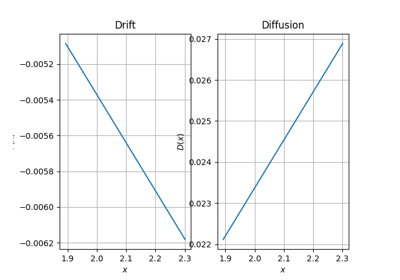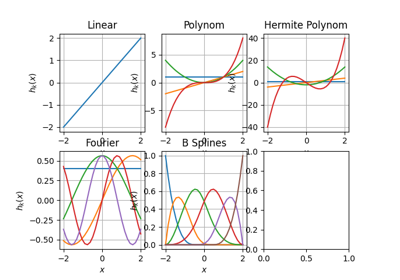folie.functions.Linear¶
- class folie.functions.Linear(domain=None, output_shape=(), coefficients=None)[source]¶
The linear function f(x) = c x
- fit(x, *args, y=None, estimator=LinearRegression(copy_X=False, fit_intercept=False), sample_weight=None, **kwargs)[source]¶
Fit coefficients of the function using linear regression. Use as features the derivative of the function with respect to the coefficients
- Parameters:
- X{array-like} of shape (n_samples, dim)
- Point of evaluation of the training data
- yarray-like of shape (n_samples,) or (n_samples, n_targets)
- Target values. Will be cast to X’s dtype if necessary.
- estimator: sklearn compatible estimator
- Defaut to sklearn.linear_model.LinearRegression(copy_X=False, fit_intercept=False) but any compatible estimator can be used.
- Estimator should have a coef_ attibutes after fitting
- fit_transform(X, y=None, **fit_params)[source]¶
Fit to data, then transform it.
Fits transformer to X and y with optional parameters fit_params and returns a transformed version of X.
- Parameters:
- Xarray-like of shape (n_samples, n_features)
Input samples.
- yarray-like of shape (n_samples,) or (n_samples, n_outputs), default=None
Target values (None for unsupervised transformations).
- **fit_paramsdict
Additional fit parameters.
- Returns:
- X_newndarray array of shape (n_samples, n_features_new)
Transformed array.
- get_params(deep=False)[source]¶
Get the parameters.
- Returns:
- paramsmapping of string to any
Parameter names mapped to their values.
- grad_coeffs(x, *args, **kwargs)[source]¶
Gradient of the function with respect to the coefficients.
- Parameters:
- xarray_like
Input data.
- Returns:
- transformedarray_like
The gradient
- resize(new_shape)[source]¶
Change the output shape of the function.
- Parameters:
- new_shapetuple, array-like
The new output shape of the function
- set_output(*, transform=None)[source]¶
Set output container.
See Introducing the set_output API for an example on how to use the API.
- Parameters:
- transform{“default”, “pandas”, “polars”}, default=None
Configure output of transform and fit_transform.
“default”: Default output format of a transformer
“pandas”: DataFrame output
“polars”: Polars output
None: Transform configuration is unchanged
Added in version 1.4: “polars” option was added.
- Returns:
- selfestimator instance
Estimator instance.
- set_params(**params)[source]¶
Set the parameters of this estimator.
The method works on simple estimators as well as on nested objects (such as pipelines). The latter have parameters of the form
<component>__<parameter>so that it’s possible to update each component of a nested object.- Parameters:
- **paramsdict
Estimator parameters.
- Returns:
- selfobject
Estimator instance.
- transform_d2x(x, *args, **kwargs)[source]¶
Hessian of the function with respect to input data. Implemented by finite difference.
- transform_dx(x, *args, **kwargs)[source]¶
Gradient of the function with respect to input data. Implemented by finite difference.
- property coefficients¶
Access the coefficients


